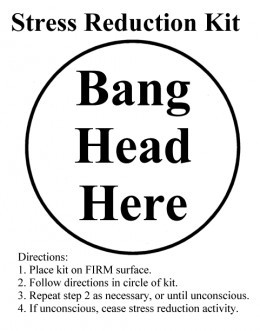 When it rains, there isn’t much you can do except take out your umbrella. When you’re waiting in line at the movies, you have no choice but to be patient. Similarly, when it comes to stress, you can do your best to try to ignore it, but in reality, your only option is to find a way to adapt to it. The problem with stress isn’t so much the stressor itself but how we deal with it.
When it rains, there isn’t much you can do except take out your umbrella. When you’re waiting in line at the movies, you have no choice but to be patient. Similarly, when it comes to stress, you can do your best to try to ignore it, but in reality, your only option is to find a way to adapt to it. The problem with stress isn’t so much the stressor itself but how we deal with it.
You face stress at work on a daily basis. The morning traffic, the influx of emails and phone calls, complaining clients, slow colleagues, and those unexpected, last-minute disasters that conveniently turn up just as you’re trying to reach a deadline. As tempting as it may be to shut off your phone and curl up into a ball under your desk, your only bet is to learn coping techniques to help you get through even the most difficult situations. And if you want to learn the best, you have to learn from the best.
Using data we collected from our Coping Skills Assessment, we divided 3,431 workers into two groups:
1) Those who are top performers and satisfied with their job,
2) Those who received poor performance ratings and who are dissatisfied with their job. We then compared them based on the techniques they used to cope with stress. Here’s what we discovered:
We then compared them based on the techniques they used to cope with stress. Here’s what we discovered:
- 67% of the top, satisfied performers look for the “silver lining” in even the most difficult situations (compared to 39% of the poor, dissatisfied performers). They believe that every problem or hardship offers the opportunity to develop their inner strength and learn a valuable lesson.
- 73% of the top, satisfied performers do their best to keep negative situations in perspective (compared to 46% of the poor, dissatisfied performers). They view problems as temporary setbacks and keep their mind focused on finding a solution.
- 71% of the top, satisfied performers regularly remind themselves to focus on the good things in their life rather than just the bad (compared to 45% of the poor, dissatisfied performers). They count their blessings, take pride in their accomplishments, and adopt an attitude of gratitude.
- 63% of the top, satisfied performers find someone to confide in/vent to when going through a difficult time (compared to 21% of the poor, dissatisfied performers). They are not afraid to turn to others for support or help when they really need it.
- Rather than deny that a problem exists, 64% of the top, satisfied performers will face a problem head-on (compared to 44% of the poor, dissatisfied performers). They recognize that avoidance and procrastination will only exacerbate an issue.
- 32% of the top, satisfied performers practice relaxation techniques, like deep breathing, on a regular basis (compared to 21% of the poor, dissatisfied performers). They give themselves time to refocus and regain perspective before tackling a problem.
- 49% of the top, satisfied performers approach stressors like they would any other problem: In a methodical, step-by-step manner (compared to 29% of the poor, dissatisfied performers). They define what the issue is, outline possible strategies, and make adjustments to their goals and behavior as required.
- And perhaps most importantly, 84% of the top, satisfied performers simply refuse to give up in the face of difficulties (compared to 59% of the poor, dissatisfied performers). While they do get discouraged from time to time, they do not allow themselves to wallow in their misery. They find a way to get their life back on track.
Remember, life isn’t about waiting for the storm to pass. It’s about learning to dance in the rain.
If you’re interested in using COSA (Coping Skills Assessment) as part of an Employee Assistance Program or tests for HR purposes, request a free trial for ARCH Profile here.Want to learn more about using psychological tests for hiring, leadership development, career development or talent retention? Download our free eBook loaded with down-to-earth information about psychological testing for HR purposes.

